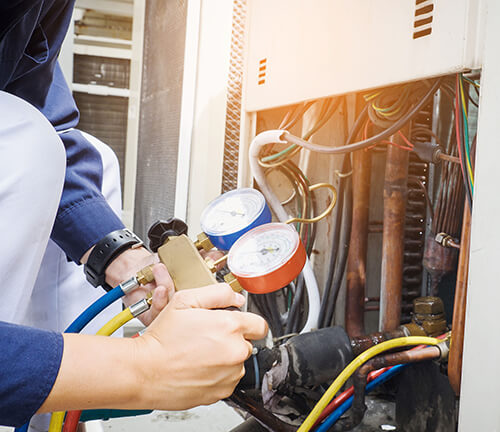Choose DMAKS HVAC for Expert and Efficient HVAC Solutions.
Energy-Efficient Cooling And Heating Solutions to Reduce Energy Expenses
As energy expenses proceed to increase, the importance of energy-efficient Cooling and heating systems ends up being significantly obvious. These systems not just guarantee significant savings on energy bills however also contribute to an extra sustainable future by decreasing energy usage.
Advantages of Energy-Efficient Heating And Cooling Equipments
Energy-efficient Cooling and heating systems use countless advantages that extend beyond simple price financial savings. By consuming less energy, these systems contribute to reduce greenhouse gas discharges, aiding to battle environment change and promote sustainability.
Furthermore, energy-efficient cooling and heating systems frequently offer improved comfort levels. Most of these systems feature sophisticated innovation that permits for far better temperature level control and boosted air top quality (DMAKS HVAC). This causes a healthier indoor environment, which is particularly important for individuals with allergies or respiratory system concerns
In addition, purchasing energy-efficient cooling and heating systems can boost residential or commercial property value. As even more customers focus on energy efficiency, homes and structures outfitted with these systems might draw in higher proposals in the actual estate market.
Kinds of Energy-Efficient Heating And Cooling Options
How can homeowners and businesses pick one of the most appropriate energy-efficient HVAC alternatives for their demands? The market offers a selection of energy-efficient cooling and heating systems, each made to improve comfort while decreasing energy usage.
One option is the variable refrigerant flow (VRF) system, which successfully controls the temperature level in multiple areas within a building. This system adjusts its refrigerant circulation to match the preferred temperature level, bring about considerable energy financial savings.
Another preferred option is geothermal heatpump, which use the earth's secure temperature to warmth and amazing spaces. By moving heat to and from the ground, these systems demonstrate impressive effectiveness, particularly in moderate environments.
Furthermore, ductless mini-split systems give an energy-efficient option for homes doing not have ductwork. These systems permit zone-specific home heating and cooling, minimizing energy waste in empty areas.
Last but not least, high-efficiency furnaces and air conditioning system, with advanced SEER and AFUE scores, supply reputable environment control while consuming less power than typical models. By examining these alternatives, homeowners and services can pick a heating and cooling system customized to their details needs and energy effectiveness objectives.
Trick Attributes to Consider

Next, investigate the sort of compressor used in the system. DMAKS HVAC. Variable-speed compressors can readjust their output to match the home heating or cooling demand, leading to enhanced convenience and energy financial savings compared to top article single-speed designs. In addition, try to find systems equipped with wise thermostats that supply programmable settings and remote accessibility, permitting far better control over energy usage
One more important attribute is the system's air purification capacity. High-efficiency filters can boost interior air quality and decrease energy intake by making sure the system runs efficiently. Consider the type of cooling agent used; modern systems frequently utilize environment-friendly cooling agents that have a lower ecological impact.
Last but not least, ensure that the system works with zoning technology, which enables for customized temperature control in different areas of your home, enhancing convenience while decreasing energy use.
Tips for Selecting the Right System


Following, take into consideration energy effectiveness rankings, specifically the Seasonal Energy Efficiency Ratio (SEER) for cooling down systems and the Annual Gas Use Performance (AFUE) for heater. Higher ratings show greater performance, which can bring useful source about considerable savings on utility expenses gradually.
Furthermore, assess the type of HVAC system that best matches your way of living and budget. Options include central air, ductless mini-splits, and warm pumps, each with its very own set of advantages and drawbacks.
Don't forget the importance of appropriate setup and sizing; an inaccurately sized system can cause inadequacies and boosted wear. Last but not least, speak with a specialist a/c service provider to get expert referrals tailored to your home's distinct requirements. This extensive method will ensure that you choose an energy-efficient a/c system that satisfies your needs and budget plan properly.
Maintenance for Optimal Performance
When the ideal heating and cooling system remains in place, continuous maintenance becomes vital to making certain optimal performance and durability. A well-kept system operates better, resulting in lower energy usage and decreased utility bills. Regular evaluations and tune-ups must be scheduled at the very least two times a year-- when before the cooling season and once before the home heating season.

Property owners must likewise be watchful concerning monitoring their heating and cooling system's performance. Unusual sounds, rising and fall temperature levels, or enhanced energy expenses can suggest underlying problems that need immediate interest. By resolving these issues immediately, house owners can stop expensive repair services and extend the lifespan of their systems.
Purchasing an upkeep strategy with a qualified specialist not only improves effectiveness yet likewise gives satisfaction, understanding that the system is running at its ideal. DMAKS HVAC. Normal maintenance is consequently crucial for sustaining power performance and decreasing general operational expenses
Conclusion
In conclusion, energy-efficient cooling and heating systems offer a sensible service for minimizing energy bills while enhancing convenience and helpful site air top quality. By including advanced technologies and alternatives such as geothermal heatpump and ductless mini-splits, property owners can attain significant power financial savings and add to ecological sustainability. Mindful factor to consider of system features and continuous maintenance better ensures ideal performance, making energy-efficient systems a sensible investment for both financial and environmental benefits.